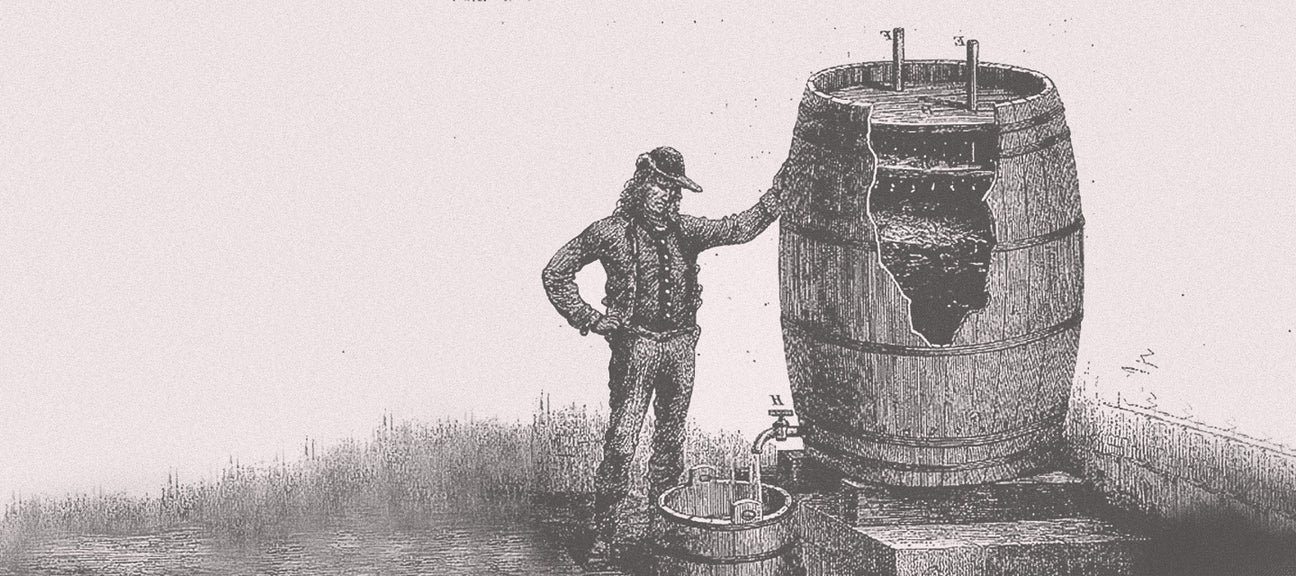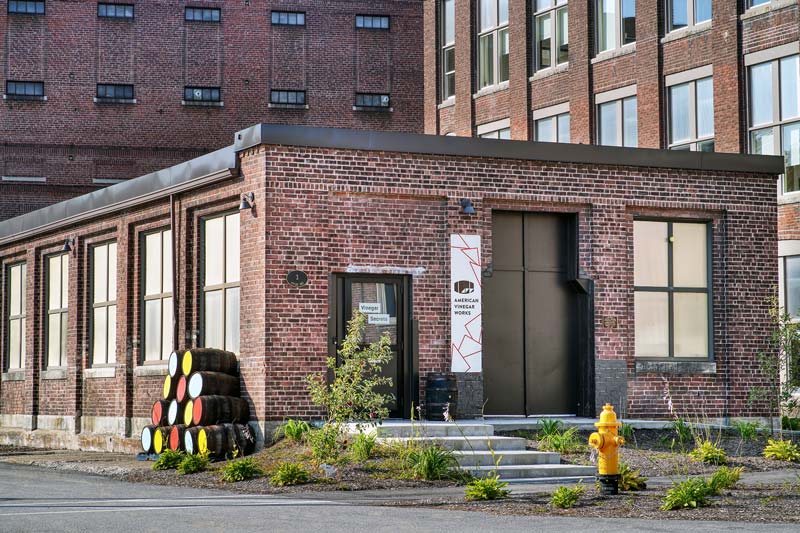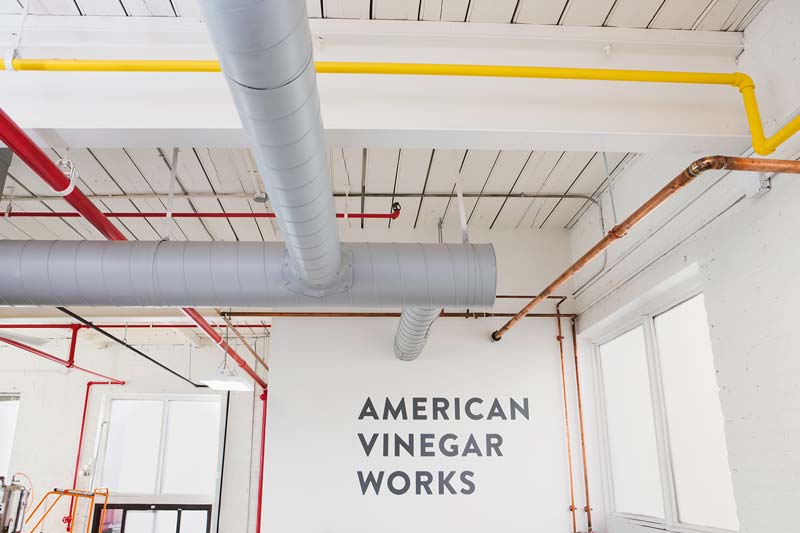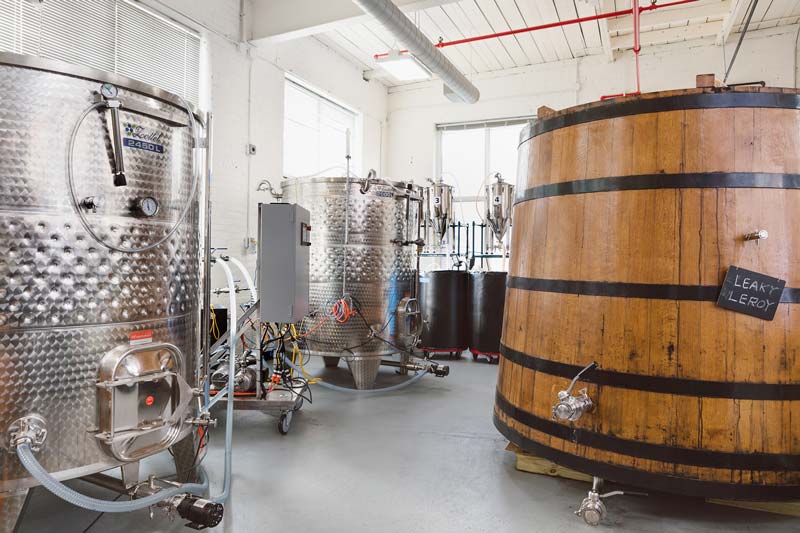Our Process

Vinegar Making 101
Five things are needed to naturally ferment vinegar: alcohol, bacteria, heat, oxygen, and time. Because you have so few levers to pull the quality of your ingredients and the process that you use are the most important components in creating great vinegars.
All natural vinegars start with alcohol—think beers, wines, sakes, and ciders if you are talking well-made vinegars and much less palatable things for lesser vinegars like distilled vinegars.
Over time and in the right conditions bacteria eat away at the alcohol and transform it into acetic acid or vinegar.
How We Make Our Vinegar
Our process is really unique and we believe it produces the best small-batch American vinegars you will find.
We know we are unique because we literally had to custom rebuild the machines we use by consulting historical records and partnering with local universities. The old academic etching you see at the top of this page is a graphic of how our machines looked when they were invented.
Our fermentation process dates from the early 1800s and this was how many quality vinegars were made centuries ago. The problem is that there was a wave of ‘innovation’ in vinegar manufacturing in the 1900s and this led to faster and cheaper vinegar. You will notice that I did not say it led to better tasting vinegar—in fact quality and flavor both suffered materially and this is how vinegar became the one-note acid bomb we now find in most supermarkets.
Our vinegars are fermented in small-batches and take two to three months just to ferment. After fermentation we age our vinegars for up to one year. Our aging process varies depending on the flavor profile we are looking to achieve. The vast majority of our vinegars are aged in 25-gallon American oak barrels previously used to make rye whiskey and bourbon. Aging in old barrels gives our vinegars complexity but does not add a woody or whiskey flavor. We source all these barrels directly from a craft distillery from our neighbors in New York.
What about ingredients? We only use quality American beers, wines, ciders, and sakes as our alcohol base to ferment our vinegars at our vinegar works in New England. Why? Because the taste of the underlying alcohol used directly impacts the flavor of the vinegar. Beyond that we are focused on creating great vinegars with a sense of place. We do not think there is something better or worse about an American wine or beer versus one from Europe for instance. We do, however, think it is important for real food like our vinegars to reflect where it comes from. In this way American Vinegar Works is building great vinegars on the shoulders of the craftspeople that are creating great and uniquely American wines, beers, sakes, and ciders. We are immeasurably grateful to them.
To find the right beer or wine for our vinegars we go through an extensive taste and test process to ensure it has the best taste profile. For example, when we set out to make our IPA and Porter Beer Malt Vinegars we went on countless road trips to craft breweries and engaged in endless tastings and fermentations until we found the two beers and breweries that we thought best exemplified the type of beer and beer vinegar we wanted to make. I know, I know, poor us…
Evaluating Vinegars
Great vinegars can transform your cooking and your cocktails.
We very much hope you will try and keep on using our vinegars but we are happy to encourage you to try other well-made vinegars as well. We have, unfortunately, seen lately a growth in well-marketed instead of well-made foods and vinegars that seem intent on misleading consumers.
Taste should be your ultimate measure in selecting your vinegar. That said, we are providing a few things you may want to think about when evaluating vinegars. Even before you have had a chance to taste them you can use this list to screen vinegars and hopefully identify the best made vinegars to try.
Vinegar Making FAQs
Who made the vinegar?
Did they actually MAKE the vinegar they are selling?
It has become common in the food world to outsource the production and, sometimes, even the recipes to third parties called ‘copackers’. A company that is dedicated exclusively to making vinegars and makes their own vinegars directly is more likely to produce a better vinegar—there is something to specialization and dedication.
On the label you want to see “Produced BY” and have that match the name of the company that is selling you the vinegar. “Distributed by”, “Produced for”, and similar terms indicate this vinegar was not made by the brand selling it to you but by a third-party. They are likely just marketing vinegar.
We make, aged, and bottle all of our vinegars ourselves in our vinegar works in New England.
What process was used? Is it water diluted?
Are they forthcoming about the process they use to make their vinegars directly or through their third-party manufacturer? Many companies are not. One trick to identify vinegars that are made using a more industrial process is to look at their ingredient list.
If you see something like “ vinegar (diluted with water to X% acidity)” in the ingredients this most likely means they are making vinegar using a more industrial technique that lets the bacteria produce higher acidity vinegar that then has to be diluted after fermentation with water to become an acid level you would want to use on your salad. This ultimately matters because it impacts the quality and taste.
Vinegar is made through fermentation so all the ingredients should be present at fermentation. If you add water after fermentation you are not only diluting the acid level you are also diluting the flavor. Think of it like a cake—a cake baked with all the ingredients is very different from a cake that was baked and only after had raw eggs added. Same ingredients but very different result.
We never add water to our vinegars after fermentation.
Is it flavorful or flavored?
We are strong believers that vinegar flavors should come from fermentation not post-fermentation infusions.
Introducing fruits, herbs, or spices during the actual fermentation process provides a greater depth of flavor and more nuance. This stands in contrast to ‘infused’ vinegars which simply add herbs or fruits to a liquid that is already vinegar. Think of it as a vinegar tea. We have even seen people call themselves vinegar makers when all they do is buy vinegars and then simply infuse the vinegar.
Infused vinegars can be fun but they lack the flavor sophistication that comes from fermentation. Some manufacturers will be upfront about infusing but, for others, you may need to ask—especially when you see a large or exotic cocktail of flavors listed.
We never infuse vinegar and only ever co-ferment.
What is the base fermentation alcohol?
Your vinegar should list its specific alcohol base either on the front label or back label ingredients. Meaning it should tell you if it is a red wine vinegar, cider vinegar, beer vinegar, etc.
Watch out for ‘spirit’ vinegars—these are just distilled white vinegars and they are sometimes mixed with thick fruit syrups that end up creating a sweet vinegar. They have a candy quality (and pretty bottles) but don’t be fooled.
You should also seek out vinegars that give you greater clarity on the type and source of your alcohol fermentation base. For instance, we disclose that our Ultimate Red Wine Vinegar is made with Syrah/Shiraz red wine from California. This helps you better understand the profile of the wine used and, therefore, the influences in the vinegar. It also tells you we are just not using ‘leftover’ wines to make our vinegars but are methodical about sourcing wines to ensure vinegar quality and flavor.
We only use American crafted beer, wine, cider, and sake as our alcohol fermentation bases.
Can you taste notes of the underlying alcohol used?
A well-made vinegar will be a clear expression of the alcohol that was used to create the vinegar.
If your malt vinegar just tastes like ‘malt’ and acid you are missing out and it tells you something about the jumbled production process. Our IPA Beer Malt Vinegar echoes the hops in an IPA whereas our Porter Beer Malt Vinegar has the darker flavors of a porter. Your vinegar should not taste like a generic and unidentifiable ‘beer’.
Our vinegars always reflect the flavors of the craft alcohols we use to make them.
Was it filtered or pasteurized?
This is another one you might have to ask about since it is not often disclosed.
A common industrial vinegar production method makes vinegar quickly but a byproduct is that the vinegars are clouded and lack luster (literally). To ‘fix’ this the vinegars are then filtered. The filtering removes flavor elements from vinegars that are already less than flavorful.
Our vinegars are never fine filtered and they are always raw. This is one reason you will see floaters in some of our bottles even as the vinegar itself is brighter. We believe this whole vinegar provides greater flavor complexity and allows the vinegars to continue to evolve over time.
Was it aged?
Vinegar benefits greatly from aging.
Over time the vinegars become less sharp and aggressive and a well-made vinegar will begin to exhibit new flavor layers. Aged vinegars are more costly to produce and can be a sign that a maker is more focused on quality over quantity.
All of our vinegars are aged after fermentation and most are aged in 25-gallon American oak barrels.
Does this list make us sound grumpy? We are vinegar makers—we get to be a bit sour!
Most of all we just get frustrated when companies try to mislead customers. We want to make sure you are armed with a ‘cheat sheet’ to help you identify authentic and well-made vinegars.
If you want to go deeper on any of these topics and many others please check out our FAQs—we really vinegar nerd out there.



